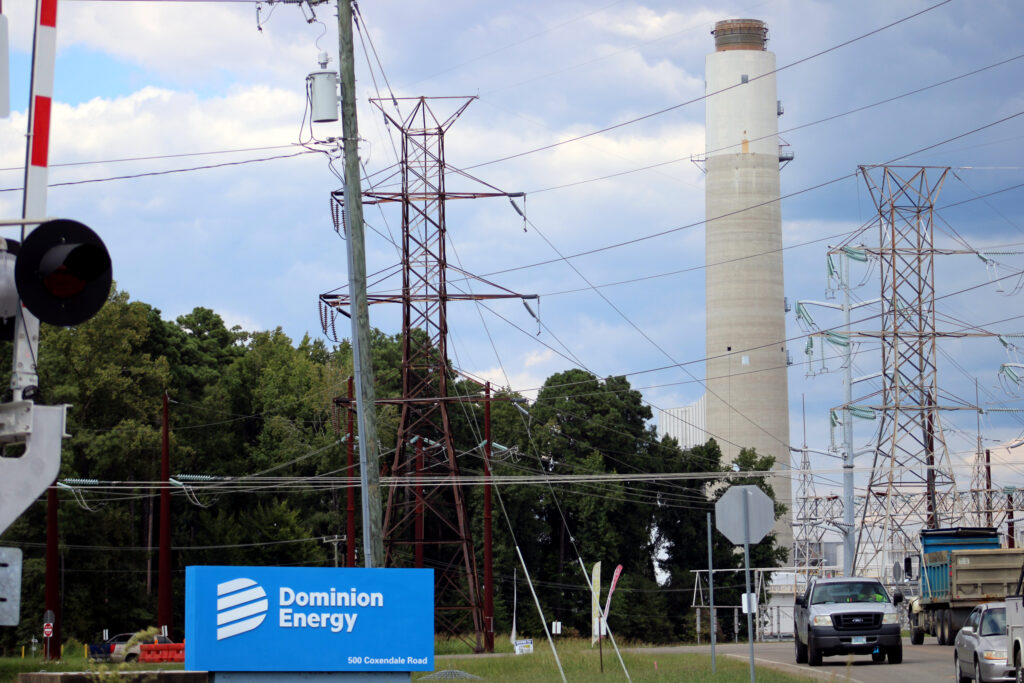Virginia Could Show How to Manage Data Center Growth. So Far, It’s a Case Study in Stalling Legislation

RICHMOND, Va.—You might think the state that is the undisputed epicenter of global internet traffic has a leg up on managing the challenges of the artificial intelligence arms race.
So far, it’s not working out that way.
Nationwide, that push by Silicon Valley is gobbling up energy, increasing average customers’ electricity bills and threatening progress on decarbonization. In Virginia, data-center developers warned the utility Dominion Energy at the end of last year that their upcoming projects would need 40 gigawatts of electricity—the energy equivalent of increasing Virginia’s households nearly fourfold.
Dominion plans to respond by building more natural gas power plants, which could raise utility bills for households and businesses both here and beyond the Mid-Atlantic state.
Virginia’s legislators certainly took notice. At least 33 unique bills were introduced in the last session to address various data-center dilemmas, an Inside Climate News analysis found.
“We are practically providing data centers for the entire world and I don’t want that cost to be borne by ratepayers in my district,” said state Del. Shelly Simonds, a Democrat representing the port city of Newport News.
But almost all of the bills ran aground, meeting cumulative resistance from tech businesses, local governments, labor unions and Republican Gov. Glenn Youngkin.
Of the four that made it into law, only two were more than a symbolic measure.
The data-center growth spurt was already putting pressure on the state’s power supplies before this year. Virginia overtook California, the most populous state, in 2023 to emerge as the top importer of electricity, driven by rapid growth in commercial power consumption.
That means the impact of Virginia’s data-center decisions extends to the wider region. It shares an interconnected grid with much of the Mid-Atlantic, and that grid’s operator is increasingly under pressure from state governors as costs spike.
“Virginia cannot produce the amount of power needed for the data centers, so we’re going to have to pipe in power from neighboring states. And if Maryland is enhancing its grid and building infrastructure, then odds are Marylanders are going to be paying for that when the power is coming here,” said Del. Ian Lovejoy, who sponsored four data-center bills last session, none of which passed.
The skyrocketing power demand is also creating hurdles for the state’s ambitions to completely wean its two largest electric utilities off planet-warming fossil fuels in the next few decades. Many data centers also have on-site diesel generators that are meant for backup power but are being run more frequently, worsening air quality and prompting noise complaints from residents.
As a result, “the rapid growth of data centers [has] surpassed all environmental issues in Virginia practically, so it’s something that demands our attention,” Simonds said.
But the failure last session of nearly all 33 bills on the subject, most without even getting a hearing, underscores the challenge of legislating on data centers in a state home to the greatest number of them.
Legislative Roadblocks
The most ambitious of the five data-center bills that the Virginia General Assembly passed was vetoed by Youngkin.
That bill would have required jurisdictions considering a data-center proposal to mandate a noise study if the site is close to homes and schools, and to review with the local utility any electric substation upgrades that would be needed.
The majority of bills, 22, never even made it out of committee. That’s the stage where a bill must get approval from a smaller group of legislators before it advances to the full chamber.
Some of the bills had bipartisan backing. But interviews with a dozen state lawmakers pointed to a range of hurdles—chief among them a muscular lobbying effort by tech companies as well as the fraught politics of treading on the decision-making domain of local officials.
Nineteen of the 33 bills were primarily sponsored by Democrats, while Republicans were the primary sponsors of the other 14. Geography, rather than politics, helps explain who pushed for change.
“In areas that are affected most egregiously by overdevelopment of data centers, you have bipartisan support for regulation,” said Lovejoy. The Republican’s district covers part of Prince William County where a local rezoning fight is unfolding over an upcoming 1,700-acre data center corridor.
“It’s when you move away from the blast zone of the impact of the data centers, people become less concerned,” Lovejoy said.
The legislative proposals covered a variety of issues: improving transparency, reforming tax incentives, protecting ratepayers, increasing state oversight and overhauling data-center siting and zoning.
Two bills that would have required data centers to disclose their often-massive water and power usage died in committee. Another seven bills that sought to change the tax incentives for data centers—some by requiring clean energy use, higher energy-efficiency or wage minimums—also all died in committee.
A handful of bills sought to explicitly protect ratepayers from bearing the costs of infrastructure that will be built to accommodate data-center growth. Under the current system, everyone pays. Two of those measures got merged, and variants passed in the House and the Senate. But the chambers could not resolve the differences.
One ratepayer-protection measure did make it into law, and it’s a meaningful change—but only for the roughly 700,000 customers served by the state’s nonprofit electric co-operatives, a fraction of the total customer base in Virginia. The new law creates a path for the co-ops to create an affiliate to serve large electricity users in order to reduce their impact on average ratepayers.
Of three bills attempting to increase state oversight, one became law—after an amendment wiped out nearly all the extra oversight it would have brought.
The original version would have required electric utilities to create a separate classification for data-center customers. The enacted version requires the state utility regulator to exercise authority it already has: to determine whether existing customer classifications are reasonable when considering rate increase requests from Dominion or Appalachian Power Co., the state’s biggest electric utilities.
Dominion now has a rate case before that regulator, the State Corporation Commission, with the powerful utility and big tech companies squabbling over what fair rates for data centers should be.
“The issue is none of this stuff has enough teeth,” said Del. Michelle Maldonado, a Prince William County Democrat who voted for the weakened bill and had sponsored one of her own that stalled. “What ultimately got passed was a significantly watered-down version.”
Del. Irene Shin, a Fairfax County Democrat, proposed the bill about the State Corporation Commission. She thinks the law it became sends “a clear signal to the SCC with what the General Assembly wants them to do.”
Those wants include “safeguards that protect ratepayers like your normal, average Virginia family, and prioritize their protections over what the big corporations need,” Shin said, “because we’re talking about billion-dollar corporations, multi-billion-dollar corporations that can absolutely afford to pay the cost of getting the energy that they need.”
Her region is taking a hit from the Trump administration’s big cutbacks to federal employment, and she’s worried about further economic consequences to residents from the One Big Beautiful Bill Act. Adding the proposed increase to Dominion customers of about $20 every month for typical households starting next year, she said, is “insane.”
Del. David Reid, a Democrat who represents part of Loudoun County, sponsored two of the four data-center bills that made it to the finish line.
The first offers an incentive for large electricity users to install battery storage.
He also sponsored legislation to build transmission lines with advanced conductor technology to deliver power more efficiently. What ultimately made it into law was diluted from a requirement to a suggestion: to “consider the prudency of using advanced conductors.”
“I was probably trying to accomplish much more in the earlier version, and then you get to the point where it’s like, OK, we can all agree to this this year,” Reid said, pointing to varying perspectives that crop up during the session. “The process works. It’s just that sometimes, in Virginia, it doesn’t work very fast.”
Over a dozen bills, more than for any other data-center issue, would have changed how localities handle siting and zoning for the facilities. None of them made it through.
One was vetoed. Another was voted down by the Senate. Two were turned down in committee, and the rest languished and expired without making it even that far.
The bill vetoed by Youngkin, which would have required a noise study and information about substation needs from data centers, had been more ambitious in an earlier iteration. Initially, the measure would have required details on the electricity generation within a locality that would serve any proposed data centers.
“The bill that we started with, that I wanted, does not look very much like the one that passed,” said Del. Josh Thomas, a Democrat representing parts of Prince William County, who sponsored the measure in the House.
In his explanation for vetoing it, Youngkin said the bill “limits local discretion and creates unnecessary red tape” and warned it “could chill investment and hinder economic development.”
“Do we need to make sure that citizen voices are heard? Yes,” the governor said afterward at an event announcing a $9 billion investment from Google. “Do we need to make sure that local leaders are empowered to make decisions about where they go? Yes. Should that be decided in Richmond? Absolutely not.”
Thomas said his constituents are frustrated about seemingly inexplicable siting decisions being made locally, and they wanted state intervention.
“The current Republican administration in Virginia has made it very clear that they are unabashedly and, at times, irrationally pro-data center,” Thomas said. “Why we would continuously build industrial sites that have diesel generators on top by schools is beyond me but yet the industry keeps pushing to have that happen.”
Following the Money
The downfall of data-center legislation in Virginia speaks, in more ways than one, to the role of money in politics, advocates and state lawmakers told Inside Climate News. The state is among the minority of states that set no contribution limits on campaign finance.
“Nobody’s immune to taking a lot of money,” said Ashish Kapoor, senior energy and climate advisor with the Piedmont Environmental Council, an advocacy group.
Dominion, which opposed two of the data-center bills, is the top political donor in the state. The company contributed more than $13 million to both parties from 2024 through Aug. 31, according to data from the Virginia Public Access Project. Powerful Silicon Valley giants have also poured money into the state in recent years, through the Data Center Coalition—which testified against many of the 33 bills—and associated political action committees.
The Data Center Coalition and Dominion Energy did not respond to requests for comment.
“Anything that makes it more difficult to lubricate the wheels of commerce from data-center development that people are making a lot of money off of is going to be met with the typical sorts of issues in subcommittees where some of these bills go to die,” Kapoor said.
Another source of pressure: localities that reap the financial benefits of this data-center growth.
“We essentially have inadvertently created a monstrous money-making machine for local governments,” said Simonds, the Newport News delegate. “A huge number of cities and localities across Virginia are lining up to have a data center because of the tax revenue.”
Loudoun County, for instance, collected $733 million, almost a third of its total tax revenue, from data centers in the 2023 fiscal year. That kind of revenue allows local governments to avoid taking the unpopular step of raising real estate taxes.
“There’s a lot of folks in rural parts of the state, we’re all for data centers,” said Del. Terry Kilgore, the Republican House minority leader representing parts of several counties in Southwest Virginia, an area that has struggled to recover from the downturn of coal.
“We need somebody to be the conductor of this orchestra.”
— State Del. Shelly Simonds
The political cost for state lawmakers to be seen as stepping on the authority of localities is especially high during a big election year. Virginia, with a Democratically controlled Senate not up for election until 2027, will vote on a new governor and all 100 House of Delegate members in November.
“The General Assembly doesn’t like to get involved in local siting issues because they don’t want to open that can of worms, so to speak,” said Lovejoy, the Prince William County delegate.
The result is an uncoordinated system in which local decisions about data centers create fallout for the power grid that will affect everyone’s pocketbook if the state doesn’t intervene.
“It’s like an orchestra where you’ve got certain instruments playing loud and unwieldy and then you’ve got other areas where they’re not playing at all,” Simonds said. “We need somebody to be the conductor of this orchestra.”
There’s also an unlikely political alliance at play.
“You have businesses and unions agreeing on something. And that doesn’t happen that often. But it’s happening over data centers,” Lovejoy said.
The support of organized labor is largely coming from the construction trades and electrical workers’ unions. In Virginia, data centers support an estimated 74,000 jobs and generate $5.5 billion in labor income, according to a study by the state’s Joint Legislative Audit and Review Commission.
This story is funded by readers like you.
Our nonprofit newsroom provides award-winning climate coverage free of charge and advertising. We rely on donations from readers like you to keep going. Please donate now to support our work.
Donate Now
Most of these jobs, however, don’t last beyond the construction stage. And “there are other unions that might be really concerned with what’s going on,” said Kasia Tarczynska, senior research analyst at Good Jobs First, a policy group that seeks to hold companies and governments accountable on economic growth.
“For example, public sector unions might be concerned that the states are losing revenue and there’s less money” to hire teachers and firefighters, she said. Virginia forgoes close to $1 billion in yearly revenue over its tax exemptions to attract data centers.
The Virginia Economic Development Partnership contended there’s a 14 percent average annual local and state tax return on the exemption incentive for the years 2022 through 2027. But there’s spirited debate across the country about whether states dangling incentives would get this development either way. And that return on investment figure doesn’t account for the extra power costs.
Economic overdependence on data centers might also prompt companies with job-intensive investments to look elsewhere with more available power supplies, Tarczynska added.
Climate and Costs
The huge increase in expected demand for power is throwing a wrench in the state’s progress toward fulfilling its legal mandate of using 100 percent carbon-free electricity by 2050. The General Assembly set that target in the Virginia Clean Economy Act of 2020.
“You can’t have your cake and eat it too,” said Sen. Russet Perry, a Democrat whose district encompasses parts of Loudoun and Fauquier counties. “You can’t continue to not regulate and to sign off on these massive data centers, each one of which often requires more power than your average city, and simultaneously say, ‘OK, we’re going to get to 100 percent clean energy on this deadline.’”
Del. Rip Sullivan, a Fairfax County Democrat, was the primary sponsor of that clean-energy law in the House. He thinks all is not lost.
“I’m not blind to the fact that it makes the road steeper, makes the challenge harder,” he said. But “if we were to put as much energy—pardon the pun—political energy into accelerating the Clean Economy Act as some opponents that you see are putting into trying to kill it, if we put all that energy into trying to improve it and meet those goals, I have every confidence we could meet them.”
One of his bills this year, which made it through the legislature but was vetoed by the governor, would have set targets for how much energy storage capacity utilities must build or buy in the next couple of decades. If enacted, it would have been a market signal for energy storage companies to come to Virginia, he said.
Ratings from the regional grid operator show solar’s effective load carrying capacity, its ability to produce energy when it’s most needed, is as low as 33 percent without storage but as high as 75 percent when paired with it.
Asked for his views on battery storage, Youngkin cited the costs of the technology, supply chains dominated by China and “great alternatives” that are available.
“If people want to invest in battery storage, God bless them. All of the above—we need everything. But to mandate what the answer is based on misinformed facts, I firmly believe is a mistake,” Youngkin said.
Meanwhile, the way that electricity rates are set by utilities and approved by state regulators is putting a disproportionate burden on households and businesses.
“We are effectively seeing customers across the Mid-Atlantic subsidizing the electrical infrastructure that’s needed for Northern Virginia’s data centers,” said Cathy Kunkel, a North America energy consultant with the Institute for Energy Economics and Financial Analysis, a global think tank with a mission to accelerate the energy transition.
Multiple state lawmakers spoke of their constituents’ electric bills while explaining their motivations for sponsoring data-center legislation.
“You have certain counties getting rich and then in other places, like my city of Newport News, I have constituents hopping mad about their energy bills going up,” Simonds said.
Thomas, the Prince William County delegate, was also concerned about declining property values. “Residents who were living in an area first, and then a data center was built later, had pretty much lost their largest wealth-building tool, which is their home value that’s plummeted because now there’s an industrial building a hundred feet from their back deck,” he said.
Legislators hoping to raise oversight to shield their constituents aren’t giving up. Sen. Danica Roem, a Prince William County Democrat, said her work for the next session can begin with the 13 Senate members who voted for a water-protection bill introduced by Sen. Richard Stuart, a Republican who represents parts of the Middle Peninsula northeast of Richmond. They just need eight more votes to get the bill out of the Senate.
“I need to bring in four more Democrats. Richard needs to bring four more Republicans,” Roem said.
House Speaker Don Scott (D-Portsmouth) and Senate Democrat majority leadership did not respond to requests for comment.
Ultimately, voters can influence what happens next.
“The pushback has to come from the ground and it has to come from the people,” Piedmont Environmental Council’s Kapoor said. “The more these legislators, whether they’re rural or urban, feel the pushback from their constituents, those [proposed bills] will have increasing resonance.”
From Sullivan’s perspective, it’s not too late for Virginia to chart a nation-leading course that avoids sticking residents with the tab for data centers, from their electric bills to the climate consequences.
“This is an immense challenge, and it is going to take a concerted effort to meet that challenge,” he said, “but the difficulty of the challenge should only embolden us rather than cause us to give up.”



